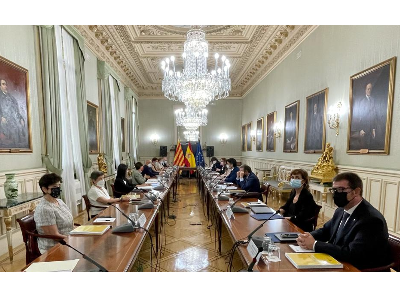- The Catalan executive has put on the table the need to address the 56 pending historical transfers in the resumption of bilateral relations with Spain 3 years later
- The vice-president Puigneró has denounced the "recentralizing" character of the Spanish government far from the supposed self-government that they preach and the counselor Vilagrà affirmed that the agreements "will not be a bargaining chip" for the negotiation table.

The Catalan Government considers that the agreements of the bilateral commission between the Catalan Government and the Spanish State have been "insufficient", although it is valued to be able to resume bilateral relations with the Spanish government 3 years later. The objective of the Catalan executive is to be able to work on all those pending transfers in order to improve the life of the citizens of Catalonia and to leave the debate on the political conflict at the negotiating table.
The councilor of the Presidency, Laura Vilagrà, has emphasized that today the steps have been small and insufficient. The councilor explained that the Catalan government has put on the table the 56 pending transfers that the State has with respect to Catalonia, but today very few have been discussed and there has been little concretion: "We have always said that we want them all and fast, because we do not want to have a feeling of déjà-vu. We want to move forward and so we will continue to claim and demand it". In this sense, he recalled that the commission serves to reach economic or social agreements to improve the lives of citizens in Catalonia and added: "In no case will these agreements be a bargaining chip for anything. We do not want the commission to be mixed with the negotiating table, where the political conflict must be resolved. That is why we call to work at this negotiating table in September to find a democratic and agreed solution to exercise the right to self-determination and amnesty”.
For his part, the Vice-President of the Government, Jordi Puigneró, has asked the Government to move if it wants to demonstrate that they are committed to self-government, as they defend: "Pedro Sánchez has repeated that no to self-determination but yes to self-government and in meetings like today's he has the opportunity to demonstrate it and, instead, today he has been clearly insufficient". "We are the government of the 52% and we intend the maximum sovereignty and those who defend self-government are the ones who have to accelerate and today they have to accelerate not too much", added the vice-president.
Puigneró denounced the recentralizing process of the Spanish government and that it clashes with the supposed self-government that they propose for Catalonia: "We have also put on the table that we are seeing laws that have a recentralizing and regressive character in terms of fundamental rights, and they must be repealed quickly".
Agreements of the bilateral commission:
- On current conflicts with the Constitutional Court (TC):
- On rent containment: it has been agreed to reconvene the same working group to negotiate the necessary legislative amendments to withdraw the appeals filed.
- On Minimum Living Income (IMV): the law, which is still pending, will continue to be negotiated before a constitutional appeal is filed. It is one of the first issues to be taken up in this new working group to set the timetable for the transfer. It has been agreed to start negotiating the transfer.
- To always prioritize the negotiation route before filing an appeal. The state commits itself not to activate by default the request for suspension of the appealed norms.
- Regarding the retirement of Mossos and rural agents: it has been agreed to work on the issue in order to bring a proposal for an agreement to the next bilateral meeting.
- On transfers:
- To finish the work of the technical committee to close the transfer of the management of scholarships and study aids so that the Catalan Government can manage the competence in the 2022-23 academic year.
- To create the working group to prioritize and schedule the first of the 56 transfers.
- Explicitly, some of the first to be worked on are: specialized health training (MIR, EIR and LLIR), maritime rescue, minimum vital income and labor legislation.
- In order to finalize the transfer of regional and commuter trains, it has been agreed that the State will make an economic proposal during the month of September regarding what remains to be transferred.
- Schedule agreement:
- Bilateral will meet again at the end of January, beginning of February.
- Joint Commission on economic and fiscal matters, in December.
- Bilateral Infrastructure Commission: October.
